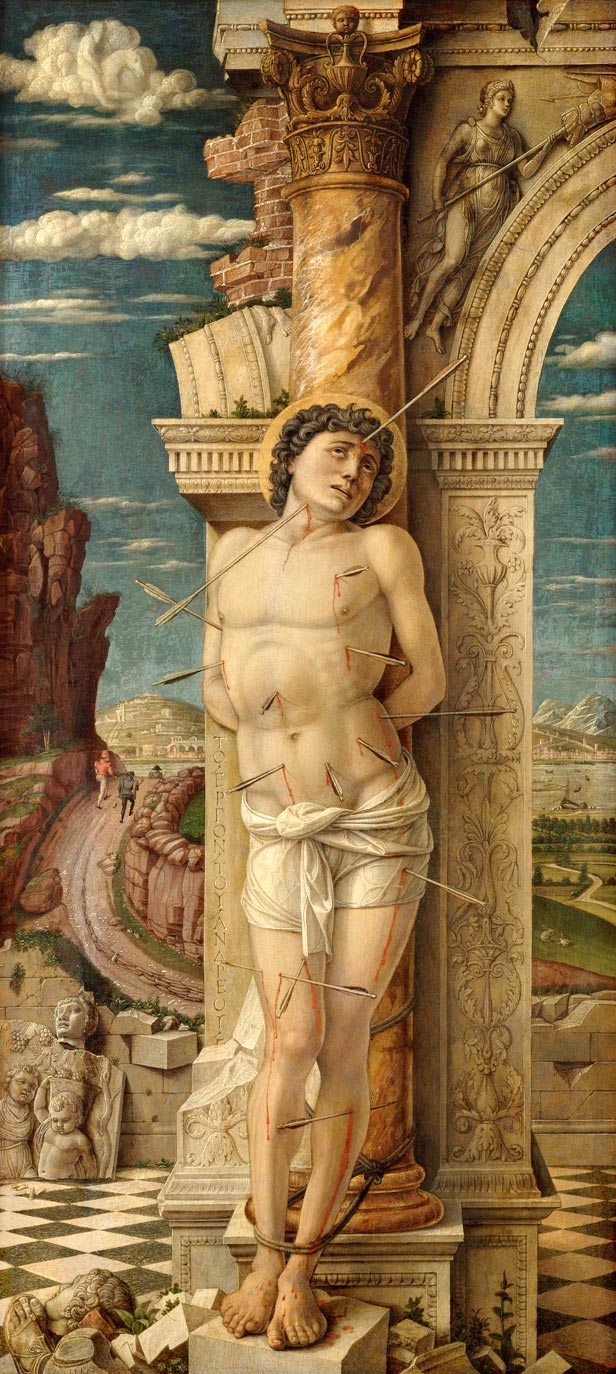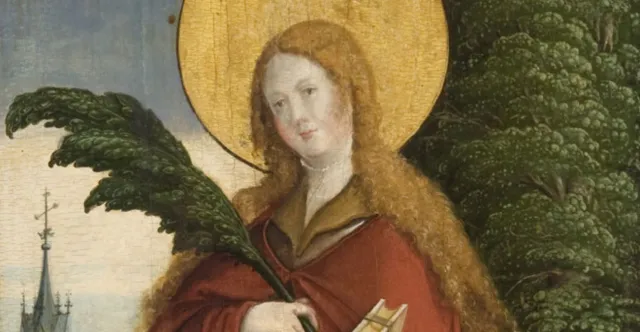On December 10, the Church honors the memory of one of its most valiant martyrs, who faced execution to bear witness to the true God. Defying her judges and her executioners, she resisted all the tortures before dying of scalding and buried in the snow.
It’s cold at the start of winter 303 in Extremadura. However, despite the biting wind, on this frosty morning of December 7, two very young girls, almost children because they are not yet thirteen, hurry along the road to Mérida. One, Eulalie , a Greek first name meaning “Well-spoken”, is the only daughter of a patrician of this city, Liberius; the other, Julia, a little slave raised with her and who became her inseparable person. For several weeks, terror has reigned in Mérida. In charge of the Western Empire, Maximian, determined to eradicate Christianity, gave ferocious orders to identify Christians, force them to deny their faith, and put to death, in the worst torments, in order to impress the others, those who refuse to abjure.
Burning to testify
A certain Datianus, a high magistrate, was entrusted with the organization of exceptional courts using expeditious methods and he put his heart into the work. This is the reason why Liberius, a Christian, wanted to remove Eulalie and her companion from the city. He knows his daughter, fears her exalted character which could push her to inconsiderate actions. And then, her only child dedicated her virginity to Christ and proposing marriage to adolescent girls suspected of being Christian and of wanting no other spouse than their God is a common way to get them to confess their faith.
For weeks, Eulalie and Julia have been holed up in a country property, far from Mérida. But not enough for them to ignore what is happening there and burn to testify, too. So, the evening before, escaping the surveillance of the servants, they fled and returned to the city. As if pushed by an inner force, Eulalie devours the road, Julia on her heels, so eager to join her that she manages to overtake her in their childish emulation; overtaking her friend, she shouts: “No matter how quickly you hurry, I will arrive before you!” » A prophecy that will soon be fulfilled.
She overthrows idols
When the teenagers arrive in Mérida, Datianus sits in his court, in the forum, and hears the defendants accused of Christianity. In order to impress them, he surrounded himself with executioners who displayed the instruments of torture, terrifying enough for many, panic-stricken, to agree to sacrifice to the idols whose statues sit on a portable altar. At this sight, Eulalie is indignant and, advancing towards the magistrate, she challenges him, mocking the mute and blind, powerless deities whom he wants to force to worship. Provocative, she dares to overthrow them, blasphemy punishable by words, and declares: “There is only one God and I have lived long enough on earth to be in a hurry to go and live in Heaven. »
She doesn’t know what she’s doing, or what she’s risking, but Eulalie disabuses him, in terms that prove her maturity.
Embarrassed, because she was informed that the insolent girl belongs to a large family in the region, touched, too, by her beauty, her courage, her childish air, he tries to reason with her, pretending not to take her actions seriously. serious. She doesn’t know what she’s doing, or what she’s risking, but Eulalie disabuses him, in terms that prove her maturity. No longer having any choice, and because the procedure provides for it, to give the accused a chance to retract, before sending her to think for a night in prison, Datianus orders her to be flogged and, because he knows modesty Christians, he orders that the young girl be stripped naked before being whipped. Eulalie endures everything without flinching. In the hope of relenting her, and because they are not burdened with a slave, the judge orders Julia to be put to death before his eyes, fulfilling the prophecy of the little girl who arrives, in fact, first in the Sky.
The judge uses the worst means
The next day, Eulalie remains firm in her faith and Datianus gets down to business. The day before, she was beaten with rods, now she is beaten with a flagrum, the whip with straps ending in lead balls from the flagellation of Christ. Her frail body is torn with horrible blows but she says: “Thank you for thus imprinting on my flesh the triumphant wounds of my Lord! » Determined to overcome this kid, the judge uses the worst means. He orders her to be scalded slowly, then molten lead to be poured over her wounds. It is so excruciating that spectators look away in shock or cry.
Look at me carefully, cruel judge, because I swear to you that you will see me again one day in the supreme tribunal, me to earn the price for my suffering, you to answer for it forever!
Eulalie, for her part, in ecstasy, seems to feel nothing and even, to the amazement of her tormentors, her wounds close while a dazzling light emanates from her tortured body. As if he wanted to dissipate the effect produced on the crowd by these miracles, Datianus increased his violence, ordering Eulalia to be burned slowly with fiery torches which consumed her flesh down to the bone. The martyr, without a complaint, raises her eyes towards the magistrate and says: “Look at me carefully, cruel judge, because I swear to you that you will see me again one day in the supreme tribunal, me to earn the price of my sufferings, you to answer for it forever! »
His martyred body is intact
Datianus then sends Eulalie to the stake. She has barely climbed in when she slowly expires. His naked and mutilated corpse is abandoned to the animals but God does not allow his chaste wife, even dead, to be desecrated by impure looks. The snow begins to fall in abundance, burying it under a white shroud. When it melts, everyone will see that the body of the martyr retains no trace of the torture inflicted. The basilica built over his tomb in Mérida was, until the Visigothic and then Arab invasions, one of the first sanctuaries in Spain. Eulalie is the patron saint of Barcelona, Bordeaux and Montpellier.
Also discover the worst tortures of the holy martyrs:

